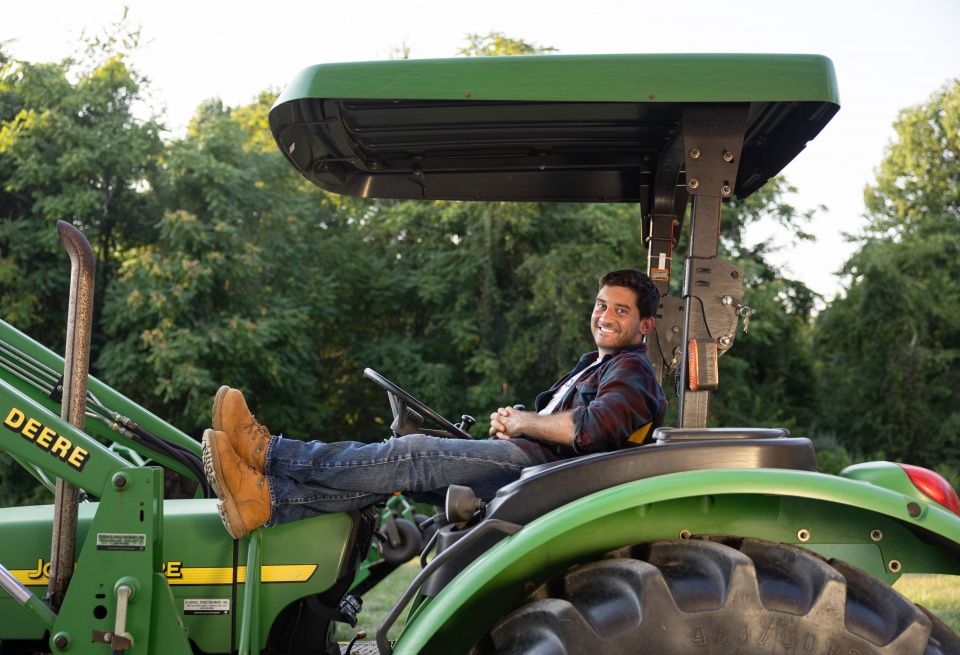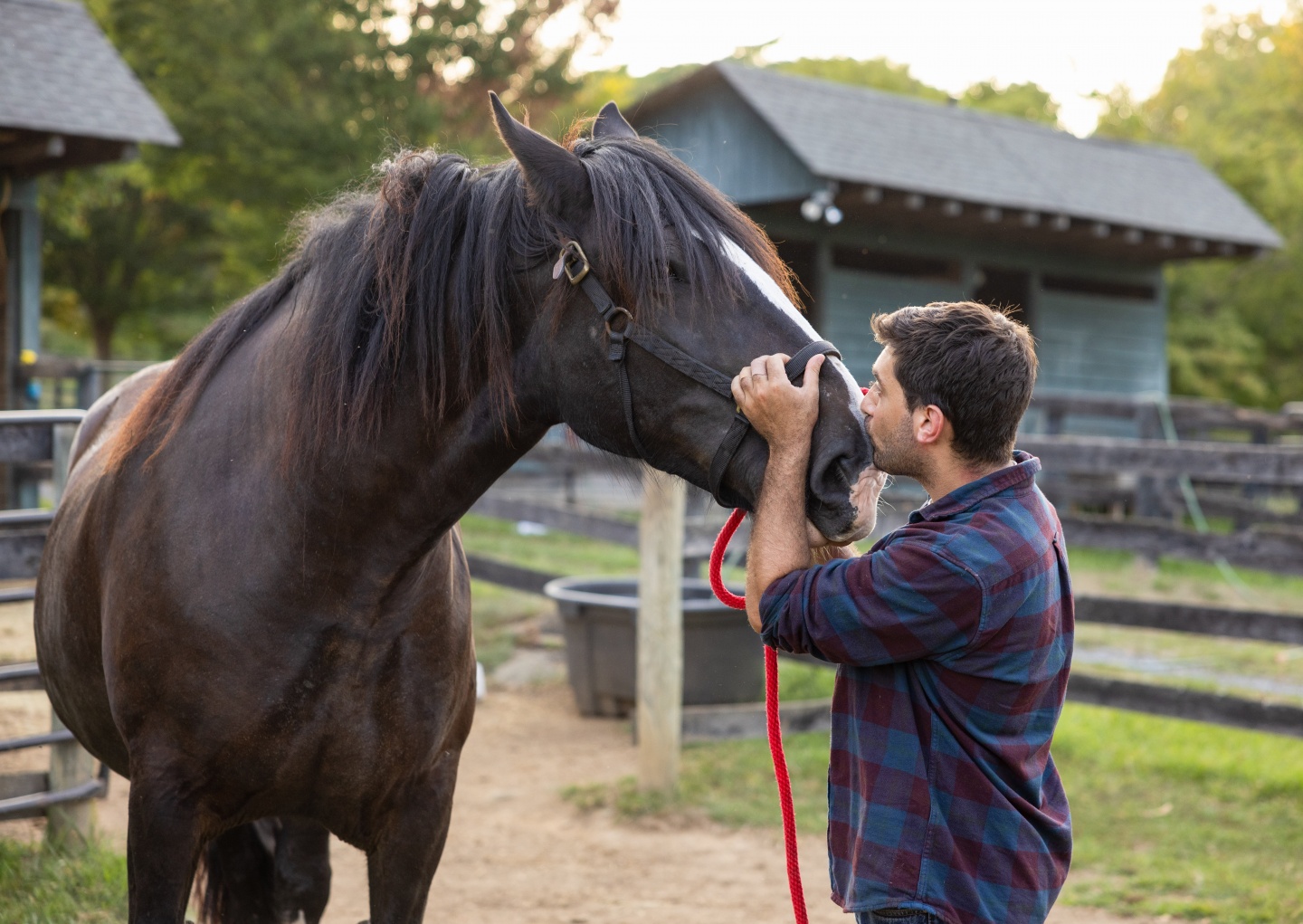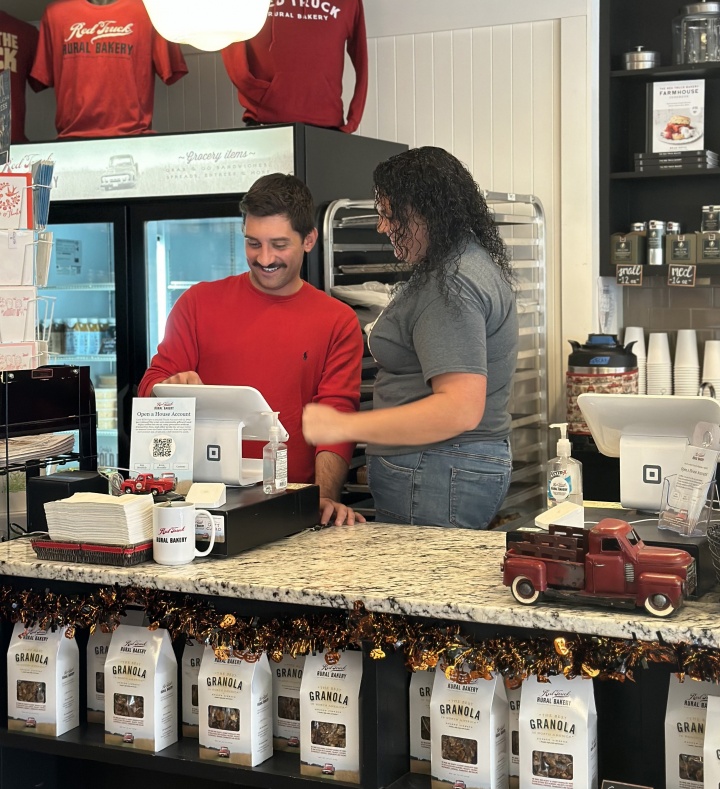Locasaur founder Simon Schwartz ’17 knows what small businesses need to succeed.
Columbia College | Columbia University in the City of New York
Locasaur founder Simon Schwartz ’17 knows what small businesses need to succeed.

Schwartz in the saddle at Tupelo Farm.
CALLIE BROADDUS
“We” in this case refers to Tupelo Farm, his family’s place in Delaplane, Va., where those peaches were grown and the jam was canned, and where Schwartz spends nearly half his time driving a tractor, baling hay and doing whatever else is needed to keep things running. The gesture is a lovely way to bring a taste of the South to a New Yorker, but it also ties into Schwartz’s larger ethos. In his other life, he is the founder of Locasaur, an app for local businesses looking to engage their most loyal customers. Schwartz believes fiercely in the importance — he would say magic — of small business. The ways they enrich communities, the small joys they bring to customers’ days. He wants to help them succeed in a digital world that he says doesn’t understand or appreciate their value. “I think those guys in hoodies in the Bay Area could stand to spend more time in rural America,” he says frankly.
The problem, as Schwartz has come to see it, is that too many tech entrepreneurs focus on creating products for independent business owners that just automate and optimize. “Sure, those qualities are good in a vacuum, but they take the personal touch out of it,” he says. “It’s the fist-bump hello, knowing your order, asking about your kids — all those little grace notes, those moments of hospitality, are what add up. That is what turns a person from a customer who spends $40 a month to one who spends $500 a month.”
Schwartz’s outlook (not to mention his work ethic) is deeply informed by his childhood. His parents bought Tupelo Farm — they named it after the Van Morrison song — just before he and his twin brother, Nathaniel, were born in 1995. It was a half-built property at the time, tucked into the Blue Ridge Mountains “as close to West Virginia as you can get without being in it.” The Schwartzes, coming from Washington, D.C., had no experience with country life. “My parents are the most industrious people I know,” Schwartz says. “They wanted to build something together as a couple. It was the mother of all fixer-uppers.” He describes his father’s ill-advised attempt to use a push mower on the entirety of their acreage; after 16 hours he came inside and declared that they needed a tractor.
“There was never a sense of us being dragged into things,” Schwartz says, looking back. “It was all fun and it was all interesting; it was what the family was doing.” He learned to fix all manner of broken machines, tended the vegetable garden and cared for a rotating cast of chickens, sheep and goats. The farm work focused mainly on horses: riding lessons, training hunter-jumpers, boarding and a little bit of breeding. Schwartz would ride them into the woods to exercise them. “I’m not religious,” he says, “but God made the world to be viewed from the back of a horse at 4:30 in the morning on a hot summer day.”

“God made the world to be viewed from the back of a horse at 4:30 in the morning on a hot summer day.”
CALLIE BROADDUS
When Schwartz was a teenager, his father became involved with Red Truck Bakery, a local legend that he helped expand to a second location, in Marshall, Va. (Both President Barack Obama ’83 and Oprah Winfrey have endorsed the pie.) “I remember Marshall as this sleepy little mountain town,” Schwartz says. “And in about an 18-month span, in addition to the bakery, my dad helped open a butcher shop and a locally sourced, farm-to-table restaurant.” It was like a sprinkle of pixie dust for the community. “All of a sudden you had people walking up and down Marshall’s Main Street. It spun this whole revitalization, based on these iconic, independent businesses that create a sense of place and that give people a reason to go there.”
At the College, Schwartz’s entrepreneurial spirit was further awakened when he joined the Columbia Organization of Rising Entrepreneurs. “I loved that these were people who actually wanted to build and put things out there into the world,” he says. Schwartz became president as a sophomore, and as a senior started working on his ideas for what became Locasaur. He launched the company in 2017, around the same time that he was accepted to the Columbia Startup Lab, which became his working home for the next two years.
Schwartz believes in slow growth and has carefully iterated Locasaur through six versions in six years. In the beginning, he knew that he mainly wanted to make business’ lives better through tech. Early offerings experimented with a virtual town square where shops and restaurants could post announcements for customers; LinkedIn-style endorsement systems so that users could spread the word about places they loved; and a Google-like search function. “Turns out, it doesn’t get much better than googling, ‘Drinks near me,’” Schwartz says wryly.
Over time, he noticed a theme — the business owners he’d talk with often had the same frustrated reaction. “Their shoulders would tense and they would sort of sigh as they tried to focus on the 15 millionth tech platform that was supposed to make their life better. You could tell how tired they were of algorithms and hashtags, when in real time they were just told, ‘Oh, the front-of-house guy just called and can’t come to work.”

Red Truck Bakery is a client of Locasaur; here, Schwartz pays a visit to retail manager Carolyn Garrett.
Courtesy of Simon Schwartz ’17
Today Schwartz and his team of five aim to capture that spirit of in-person experience in the digital space: Locasaur is the Anti-Seamless, where rather than offering a templated experience that’s the same no matter where a customer orders from, a business can tailor the platform to reflect its brand and voice. “You can have a digital transaction experience that feels like you,” he says.
The platform’s latest feature, added this past summer, is house accounts; they lean into Schwartz’s conviction that catering to a business’ regulars is the key to success. The accounts are exactly what they sound like — a way for customers to pay in advance for that month’s purchases. “It really streamlines the businesses’ cash flow, and gives them income up front,” Schwartz says. “They also end up getting more money — we’ve seen close to 30 percent higher order volume via house accounts. And maybe the business decides to reward the customer with a $10 bonus or something nonmonetary each month as a thank-you. But it’s also the ultimate insider perk. You just say, ‘Put it on my house account.’”
Locasaur is pitched at independently owned businesses with less than 10 storefronts; its clients are about 70 percent food and beverage, and 30 percent retail. When not in Virginia, Schwartz can be found in New York City, where his network is strongest, and increasingly, in Charleston, S.C. “I love the mid-market southern cities. There are fewer of us trying to hawk our services there, so the restaurants and retailers are a little more inclined, and the communities are a bit tighter. If you are a chef in Charleston, you know everyone else.”
Schwartz tells me he possesses an existential fear of his hometown becoming like Fairfax, Va., which is to say (all respect to Fairfax) just another suburb filled with Starbucks, McDonald’s, Exxon and the rest. That he can be a bulwark against that type of change is motivating. In his mind, “If Locasaur succeeds, I get to keep the farm. What I mean by that is, if Locasaur succeeds, iconic, independent businesses have a real ally in tech — which they don’t right now, no matter what Toast or any other industry people tell you. But if small business can thrive in the digital world, then it’s exponentially more difficult for chains to come in, which means communities like Delaplane get to stay put a while longer.”
As our conversation winds down, we return to Tupelo Farm. When peach season ends, Schwartz says, it’ll be time for baling hay — a three-day, all-hands-on-deck event. “It was always my favorite thing to do growing up. Even little Simon could sit on the tractor and pump out the hay bales. At night you have a bonfire or something. It’s very communal.”
He refers to the family’s new tractor, JD3. “JD1 was what my dad got after realizing a lawn mower wasn’t a tractor,” he says. “Then he made a plan: Buy a new one every 15 years. We still have the other two, but this is the first with AC and an enclosed cab.” Schwartz notes that with each, there’s been a sense of one chapter ending and a new one beginning. “I got a little bit emotional when JD3 arrived. This will probably be the one that I teach my kids to tractor on.”

Published three times a year by Columbia College for alumni, students, faculty, parents and friends.
Columbia Alumni Center
622 W. 113th St., MC 4530, 6th Fl.
New York, NY 10025
212-851-7852
cct@columbia.edu

Columbia Alumni Center
622 W. 113th St., MC 4530, 4th Fl.
New York, NY 10025
212-851-7488
ccalumni@columbia.edu